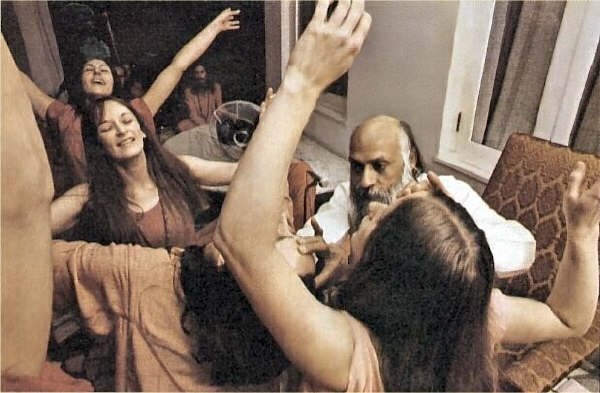THERE WILL BE A PRECIOUS VALUE TO THIS BOOK WHEN IT COMES OUT, BECAUSE IT CAN TELL PEOPLE THAT THERE IS A BUDDHA AVAILABLE NOW, AND THAT HE HAS METHODS SUITABLE TO THE TIME AND TO US.
BUT ONE OF THE QUESTIONS WHICH HAS ARISEN HERE AND WILL CERTAINLY ARISE IN THE WEST IS: HOW DO I KNOW I NEED A MASTER?
Yes, this book is going to be very precious. Keep, preserve it. Seven generations of masters have given it to me and I have given it to you. Now it depends on what you do. I have added my understanding to it, but as far as I'm concerned I am giving you this book just to throw in the fire. The day you can throw it in the fire will be the day you have understood it. If you go on preserving it you have missed.
But the book is needed, because if it is not there what will you throw in the fire? It is needed. Try to preserve it — it is very precious — and when you understand you will throw it in the fire.
So I am not saying give only the Koran to the fire; give my books to the fire also, because they can be more dangerous than the Koran and Gita and Bible which have become out of date in a sense. You are very, very far away from Mohammed, even further away from Krishna. Their voices have become very, very distant, dim things. My voice is nearer to you. It is immediate; it is direct. It may become a greater prison for you, because it is more alive right now. It can capture you; it can become more of a burden. If a living master can free you, a living master can become more of a prison also. It depends.
There are directions in the book. It is a map, a map into the world of consciousness, a map of how to get roots into the earth, a map of how to get wings into the sky. But trees don't need it. If I tell them how to get roots into the earth they will say, "Don't disturb us, we have already got roots into the earth" If I tell them how to get wings into the sky they will say, "Don't disturb the silence. We are always standing in the sky, swaying in the sky." And if I tell them to preserve this book they will laugh, and if they can find a fire they will throw the book in it.
So what am I saying? I am saying to you: Get roots and throw away the maps; get wings and throw away the maps. Don't get fixed on what I say, don't be obsessed with what I say. Put the words aside and look at me. And what I hope is that one day, if I say, "Preserve this book," you will be able to shout at me and say, "What are you saying? Have you gone mad?" You can say that without reaching the point where it becomes meaningful — but you cannot deceive me. You can throw the book into the fire without throwing the attachment. Then you are imitating. Imitation won't help. Buddhas have existed on the earth, disciples have existed; everything has happened that can happen and everything is written. You may decide you can imitate, but imitation won't help.
It happened once that a man came to a Zen master. He had read all the scriptures, memorized them, and had become a great philosopher because he was very efficient at using words, logic. And this Zen master was just a villager, just like the beggar who said, "I am not lost." He had never read the Lotus Sutra, one of the greatest Buddhist scriptures, worth preserving, always keeping near. Just as there are bedside books, so the Lotus Sutra is a heartside book; it is concerned with the heart. The lotus is the symbol for the heart: fully bloomed, in full bloom, it is the heart. And Buddhists think there is nothing comparable to the Lotus Sutra.
This man had memorized the whole Lotus Sutra. He could repeat it from anywhere. Ask any question and immediately he would answer — like a computer, very efficiently. So he asked the Zen master, "Have you read the Lotus Sutra?"
The Zen master said, "Lotus Sutra? Never heard of it."
The man, the pundit, the scholar, said, "Never heard of it? And people think you are enlightened!"
The Zen master said, "People must be wrong. I am an ignorant man, how can I be enlightened?"
The scholar was at ease now, so he said, "Now I will repeat the Lotus Sutra. Can you read?"
The monk said, "I can't read."
So the man said, "Okay, then listen to me and I will explain anything you want to ask."
He had come to seek a master but now he had become a master. The ego never wants to be a disciple, it is always in search of being a master. How the buddha must have laughed at the situation! The master became the disciple, and the disciple became the master and said, "Listen."
The master started listening. The disciple said, "Okay." He began to repeat the Lotus Sutra.
In the Lotus Sutra, it is said everything is emptiness — this world is empty, hell is empty, heaven is empty, God is empty, everything is emptiness. Emptiness is the nature of all things, nothingness, so be attuned to nothingness and you will achieve.
Suddenly the master jumped and hit the pundit on the head. The pundit became mad. He started shouting and said, "Not only are you not enlightened, not only are you ignorant, you seem to be neurotic also. What are you doing?"
The master sat again and said, "If everything is nothingness, from where does this anger come? The world is emptiness, heaven is emptiness, hell is emptiness, the nature of things is nothingness. From where does this anger come?"
The pundit was puzzled. He said, "It is not written in the Lotus Sutra. You ask foolish questions. It is not written in the Lotus Sutra. The whole Sutra I have memorized — and this is no way of asking a question, hitting me is no way of asking a question."
But this is the only way. Theories are not of much help. You can say that everything is nothingness, but just a little hit and anger arises out of nothingness; a woman passes and sex arises out of nothingness; you look at a beautiful house and the desire to possess arises out of nothingness. When Buddha said everything is nothingness, he was saying: If you can understand this, nothing will arise. How can anything arise out of nothingness? Nothingness is a meditation, not a theory; it is a falling into the abyss. Then anger cannot arise and sex cannot arise — how can they?
There are two types of persons: one, those who are in search of theories — and please don't be that type, because that is the most stupid type; and the other type is the wise type, those in search of experience, not of theories.
This book and whatsoever I say can become a theory for you; then you miss. It can become a thirst, a hunger, a deep urge to experience; then you have got the point. But don't be addicted to the words; don't carry the container, remember the content. When the disciple threw the book into the fire he was throwing away the container; the content was preserved in his heart. And the master was happy that this man had understood: the container has to be thrown away and the content preserved.
Whatsoever I say, throw it in the fire. But whatsoever happens to you in my presence, that is the content. Preserve it, it is precious. But there is no need to preserve it: if it happens, you will preserve it; if you know, it is preserved, and then there is no way to throw it in the fire. Only books can be thrown in the fire, truth cannot.
That's why the disciple shouted, "What are you saying? Can a precious thing be thrown into the fire? Can a precious thing be burned in the fire? If the fire can burn your book, what type of preciousness is it? What type of truth is this? If the fire can burn the truth, it is not worth preserving."
That which cannot be burned, that which cannot be dead, even through fire it becomes more alive, more pure — that is the truth. That's why I said throw The Bible into the fire: not that I am against The Bible, I am against the container. The content cannot be thrown. The container is the Lotus Sutra. The content is in your lotus, and that is your heart.
Anything more?
OSHO
From : A Bird on the Wing. ch. 8


